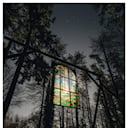In what year did the 'Tiananmen Square Massacre' occur?
The Tiananmen Square protests of 1989, commonly known in mainland China as the June Fourth Incident, were student-led demonstrations in Beijing, the capital of the People's Republic of China, in 1989. More broadly, it refers to the popular national movement inspired by the Beijing protests during that period, sometimes referred to as the '89 Democracy Movement. The protests were forcibly suppressed after the government declared martial law. In what became known in the West as the Tiananmen Square Massacre, troops with assault rifles and tanks killed at least several hundred demonstrators trying to block the military's advance towards Tiananmen Square. The number of civilian deaths has been estimated at anywhere from hundreds to thousands.
Set against a backdrop of rapid economic development and social changes in post-Mao China, the protests reflected anxieties about the country's future in the popular consciousness and among the political elite. The reforms of the 1980s had led to a nascent market economy which benefitted some people but seriously disaffected others; the one-party political system also faced a challenge of legitimacy. Common grievances at the time included inflation, limited preparedness of graduates for the new economy, and restrictions on political participation. The students called for democracy, greater accountability, freedom of the press, and freedom of speech. At the height of the protests, about a million people assembled in the Square.
More Info:
en.wikipedia.org






